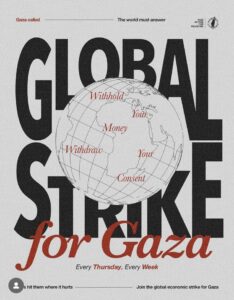ガザのためのグローバルストライキとは、毎週木曜日に呼びかけられている世界的な経済ストライキだ。
Bisan Owdaさんの呼びかけで始まった。
詳しい内容は次のとおりだ。
(日本語版の画像は日本語で知る歴史🇵🇸palestinejpnのこちらの投稿から引用している。)
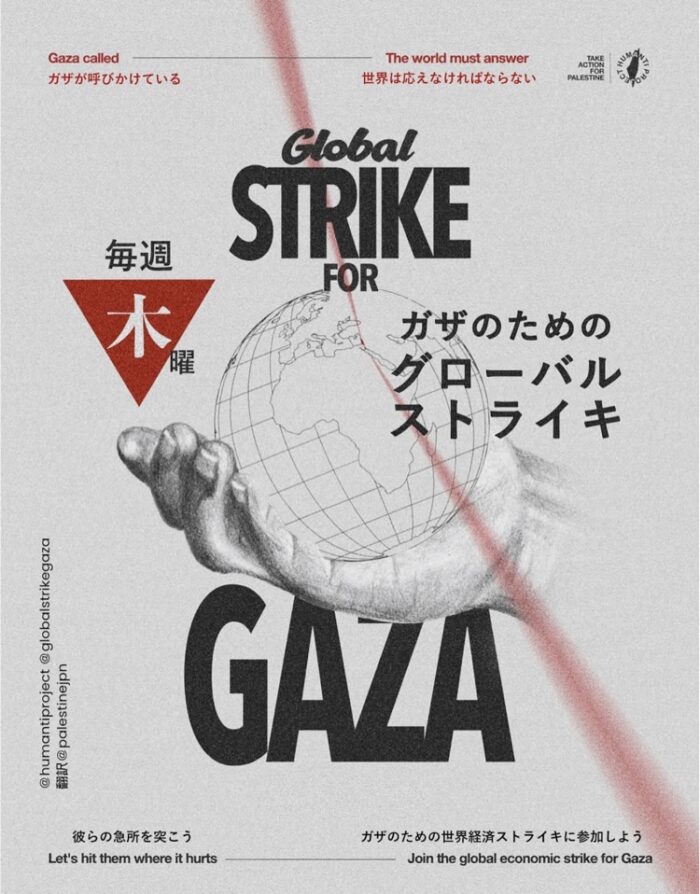
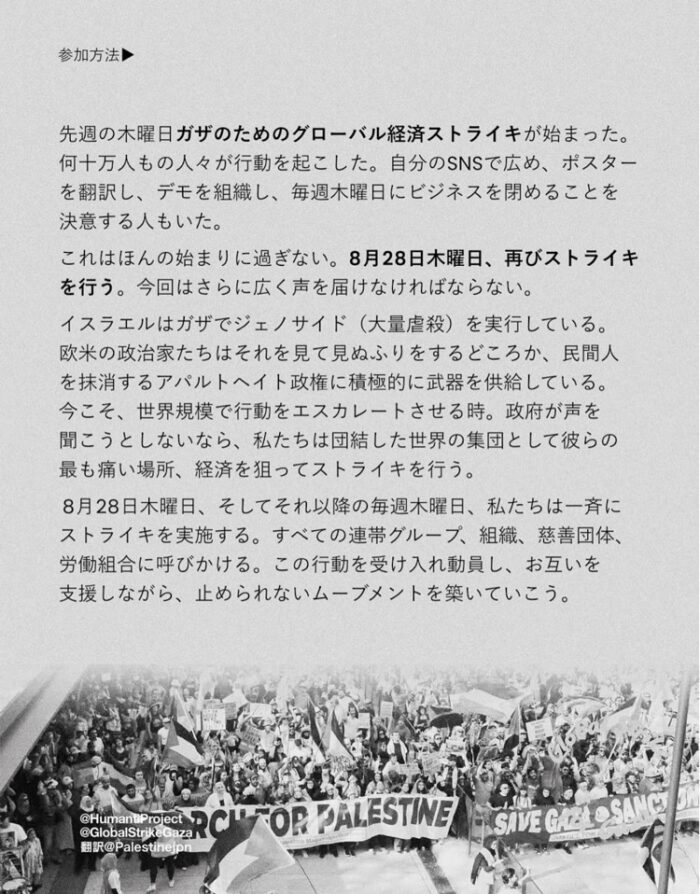
参加方法▶
先週の木曜日ガザのためのグローバル経済ストライキが始まった。
何十万人もの人々が行動を起こした。自分のSNSで広め、ポスターを翻訳し、デモを組織し、毎週木曜日にビジネスを閉めることを決意する人もいた。
これはほんの始まりに過ぎない。8月28日木曜日、再びストライキを行う。今回はさらに広く声を届けなければならない。
イスラエルはガザでジェノサイド(大量虐殺)を実行している。
欧米の政治家たちはそれを見て見ぬふりをするどころか、民間人を抹消するアパルトヘイト政権に積極的に武器を供給している。
今こそ、世界規模で行動をエスカレートさせる時。政府が声を聞こうとしないなら、私たちは団結した世界の集団として彼らの最も痛い場所、経済を狙ってストライキを行う。
8月28日木曜日、そしてそれ以降の毎週木曜日、私たちは一斉にストライキを実施する。すべての連帯グループ、組織、慈善団体、労働組合に呼びかける。この行動を受け入れ動員し、お互いを支援しながら、止められないムーブメントを築いていこう。
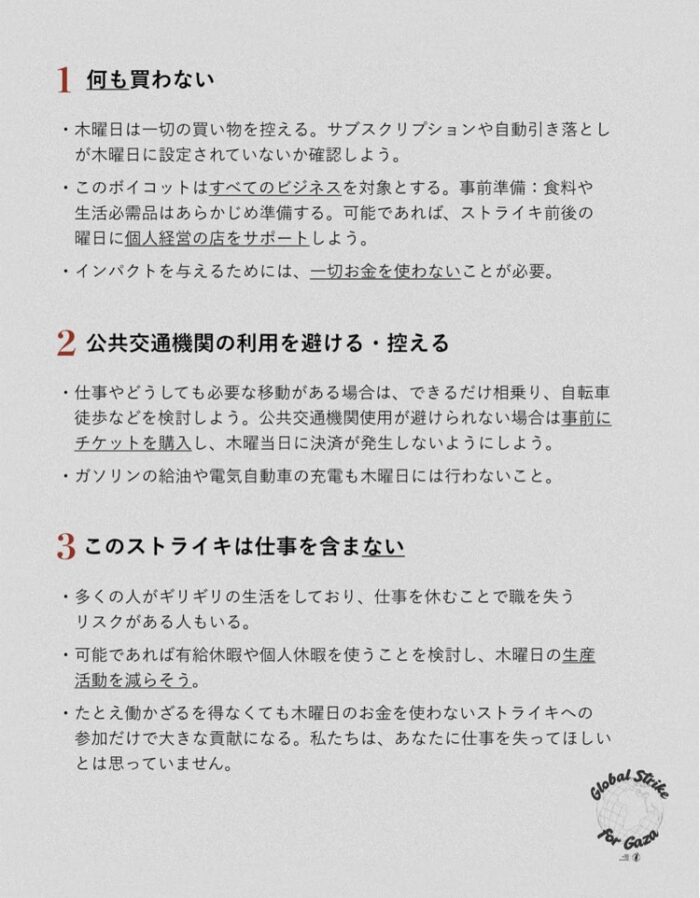
1 何も買わない
- 木曜日は一切の買い物を控える。サブスクリプションや自動引き落としが木曜日に設定されていないか確認しよう。
- このボイコットはすべてのビジネスを対象とする。事前準備:食料や生活必需品はあらかじめ準備する。可能であれば、ストライキ前後の曜日に個人経営の店をサポートしよう。
- インパクトを与えるためには、一切お金を使わないことが必要。
2 公共交通機関の利用を避ける・控える
- 仕事やどうしても必要な移動がある場合は、できるだけ相乗り、自転車徒歩などを検討しよう。公共交通機関使用が避けられない場合は事前にチケットを購入し、木曜当日に決済が発生しないようにしよう。
- ガソリンの給油や電気自動車の充電も木曜日には行わないこと。
3 このストライキは仕事を含まない
- 多くの人がギリギリの生活をしており、仕事を休むことで職を失うリスクがある人もいる。
- 可能であれば有給休暇や個人休暇を使うことを検討し、木曜日の生産活動を減らそう。
- たとえ働かざるを得なくても木曜日のお金を使わないストライキへの参加だけで大きな貢献になる。私たちは、あなたに仕事を失ってほしいとは思っていません。
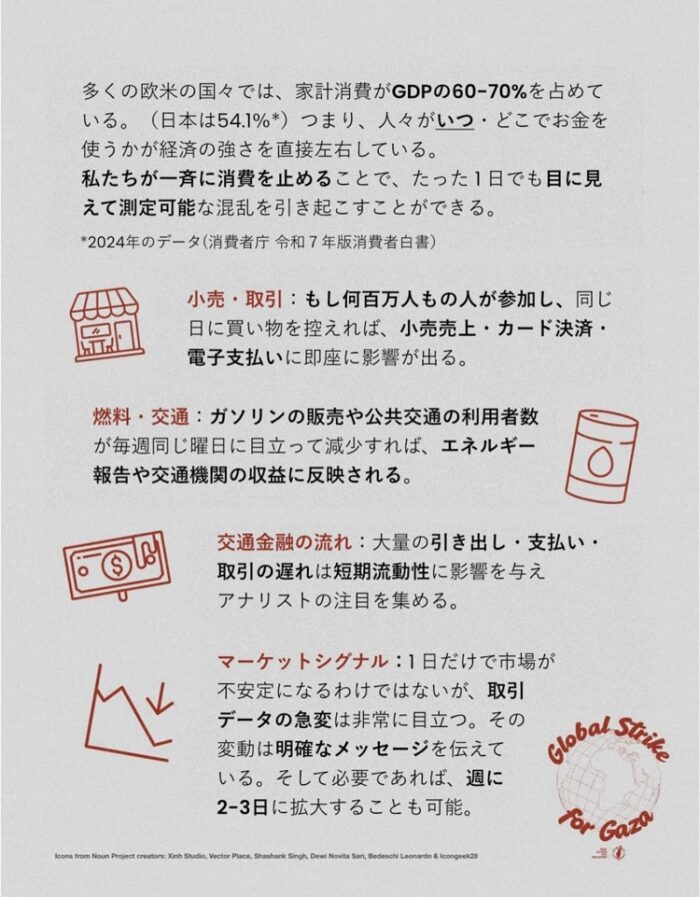
多くの欧米の国々では、家計消費がGDPの60-70%を占めている。(日本は54.1%*)つまり、人々がいつ・どこでお金を使うかが経済の強さを直接左右している。
私たちが一斉に消費を止めることで、たった1日でも目に見えて測定可能な混乱を引き起こすことができる。
*2024年のデータ(消費者庁 令和7年版消費者白書)
小売・取引:もし何百万人もの人が参加し、同じ日に買い物を控えれば、小売売上・カード決済・電子支払いに即座に影響が出る。
燃料・交通:ガソリンの販売や公共交通の利用者数が毎週同じ曜日に目立って減少すれば、エネルギー報告や交通機関の収益に反映される。
交通金融の流れ:大量の引き出し・支払い・取引の遅れは短期流動性に影響を与えアナリストの注目を集める。
マーケットシグナル:1日だけで市場が不安定になるわけではないが、取引データの急変は非常に目立つ。その変動は明確なメッセージを伝えている。そして必要であれば、週に2-3日に拡大することも可能。
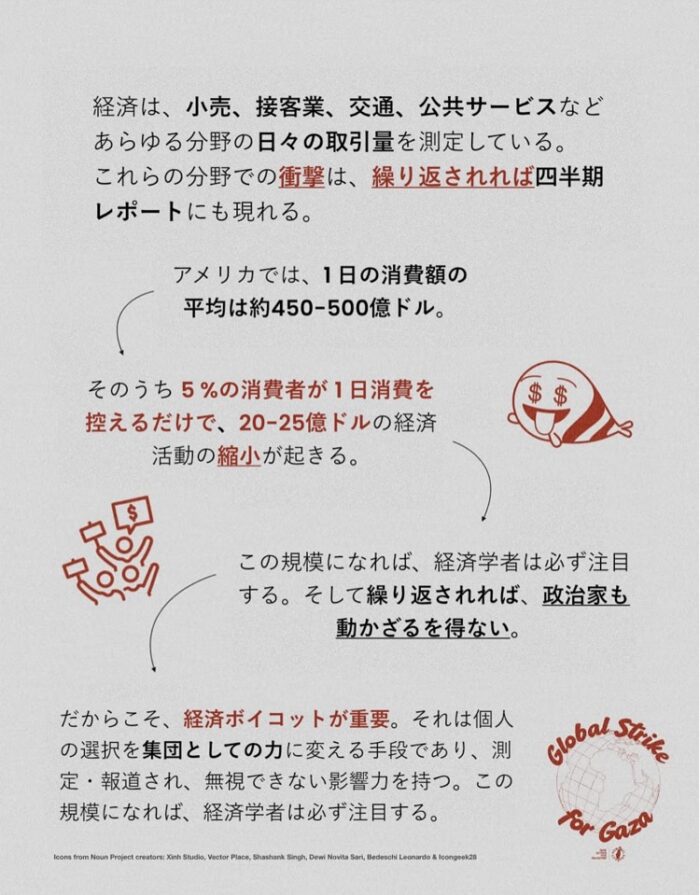
経済は、小売、接客業、交通、公共サービスなどあらゆる分野の日々の取引量を測定している。
これらの分野での衝撃は、繰り返されれば四半期レポートにも現れる。
アメリカでは、1日の消費額の平均は約450-500億ドル。
そのうち5%の消費者が1日消費を控えるだけで、20-25億ドルの経済活動の縮小が起きる。
この規模になれば、経済学者は必ず注目する。そして繰り返されれば、政治家も動かざるを得ない。
だからこそ、経済ボイコットが重要。それは個人の選択を集団としての力に変える手段であり、測定・報道され、無視できない影響力を持つ。この規模になれば、経済学者は必ず注目する。
These are details of Global Strike for Gaza.
Images are from Humanti Project's Instagram post.
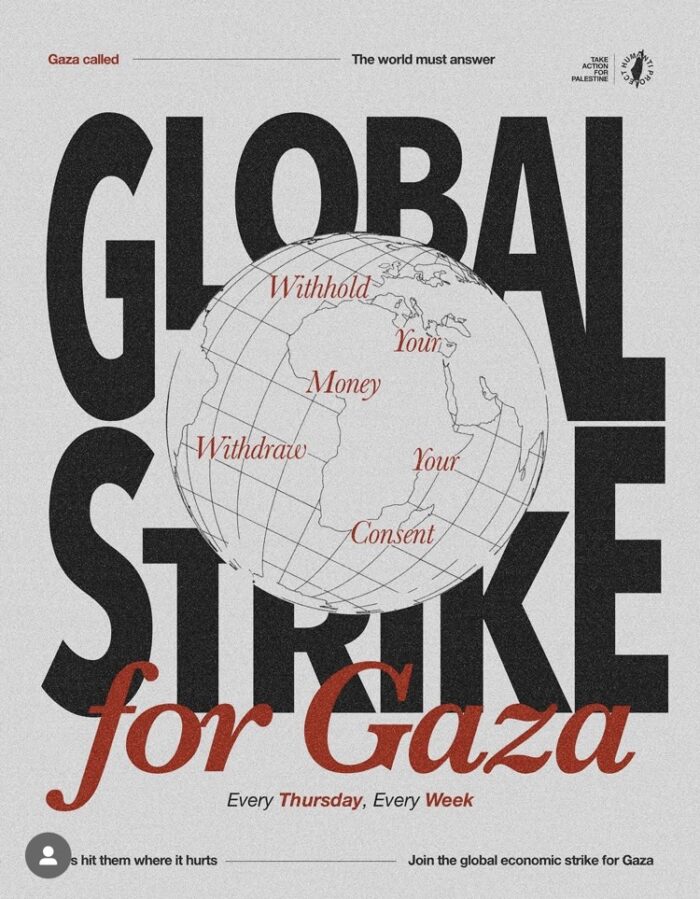
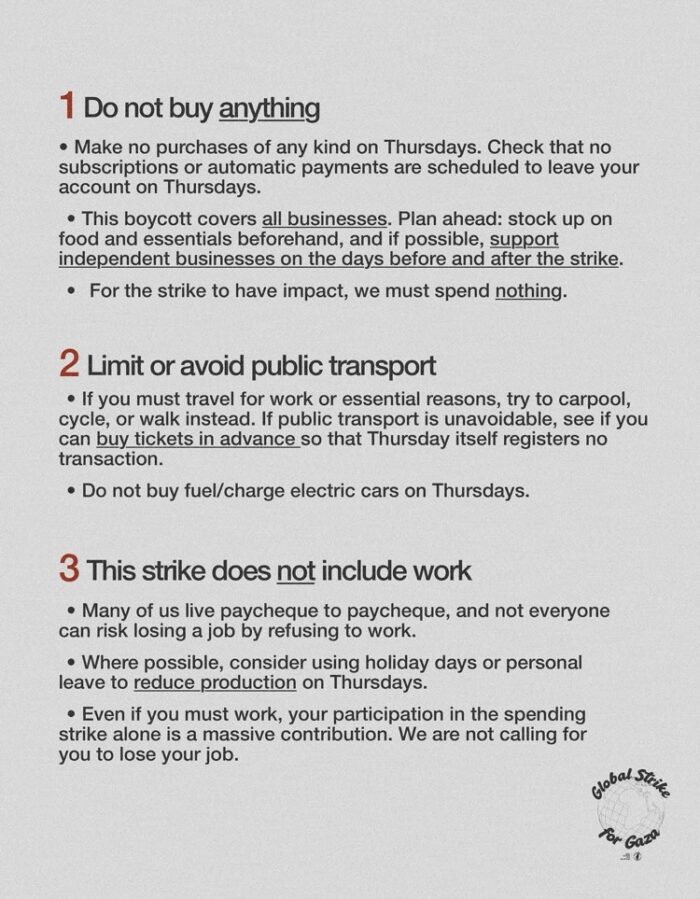
1 Do not buy anything
- Make no purchases of any kind on Thursdays. Check that no subscriptions or automatic payments are scheduled to leave your account on Thursdays.
- This boycott covers all businesses. Plan ahead: stock up on food and essentials beforehand, and if possible, support independent businesses on the days before and after the strike.
- For the strike to have impact, we must spend nothing.
2 Limit or avoid public transport
- If you must travel for work or essential reasons, try to carpool, cycle, or walk instead. If public transport is unavoidable, see if you can buy tickets in advance so that Thursday itself registers no transaction.
- Do not buy fuel/charge electric cars on Thursdays.
3 This strike does not include work
- Many of us live paycheque to paycheque, and not everyone can risk losing a job by refusing to work.
- Where possible, consider using holiday days or personal leave to reduce production on Thursdays.
- Even if you must work, your participation in the spending strike alone is a massive contribution. We are not calling for you to lose your job.
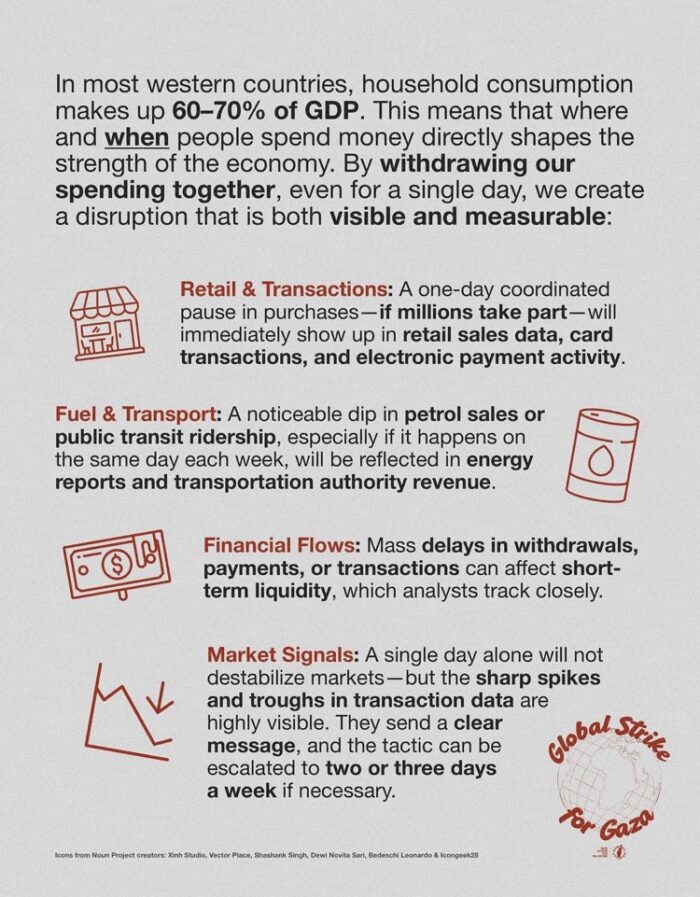
In most western countries, household consumption makes up 60-70% of GDP. This means that where and when people spend money directly shapes the strength of the economy. By withdrawing our spending together, even for a single day, we create a disruption that is both visible and measurable:
Retail & Transactions: A one-day coordinated pause in purchases-if millions take part-will immediately show up in retail sales data, card transactions, and electronic payment activity.
Fuel & Transport: A noticeable dip in petrol sales or public transit ridership, especially if it happens on the same day each week, will be reflected in energy reports and transportation authority revenue.
Financial Flows: Mass delays in withdrawals, payments, or transactions can affect short-term liquidity, which analysts track closely.
Market Signals: A single day alone will not destabilize markets —but the sharp spikes and troughs in transaction data are highly visible. They send a clear message, and the tactic can be escalated to two or three days a week if necessary.
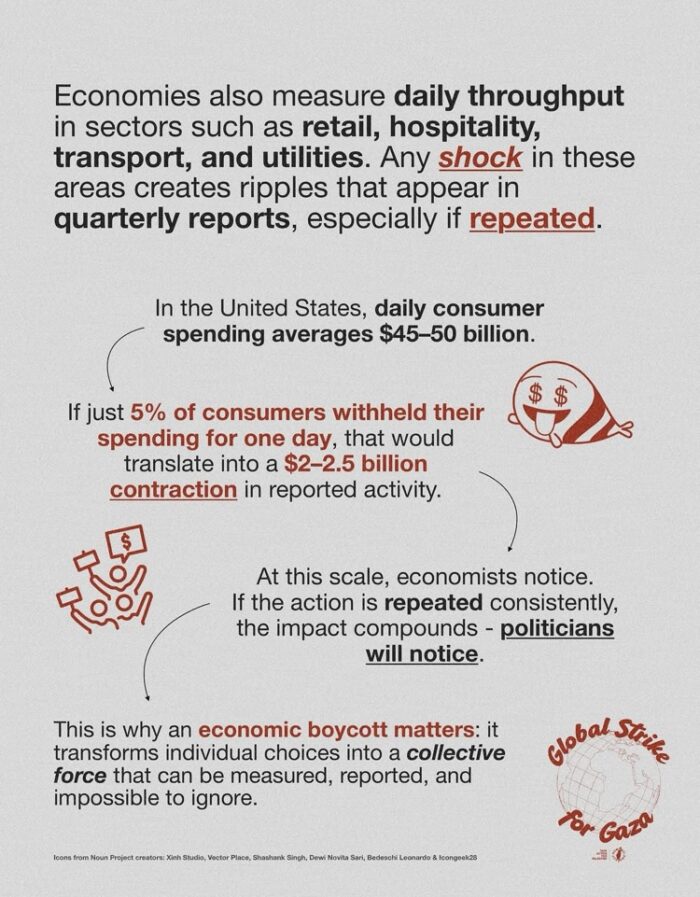
Economies also measure daily throughput in sectors such as retail, hospitality, transport, and utilities. Any shock in these areas creates ripples that appear in quarterly reports, especially if repeated.
In the United States, daily consumer spending averages $45-50 billion.
If just 5% of consumers withheld their spending for one day, that would translate into a $2-2.5 billion contraction in reported activity.
At this scale, economists notice.
If the action is repeated consistently, the impact compounds - politicians will notice.
This is why an economic boycott matters: it transforms individual choices into a collective force that can be measured, reported, and impossible to ignore.
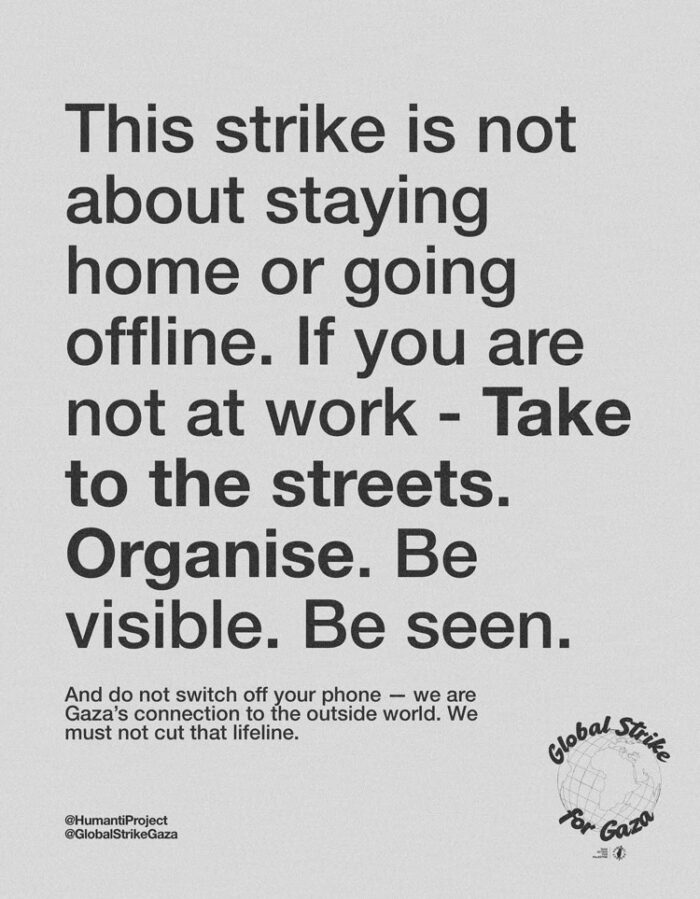
This strike is not about staying home or going offline. If you are not at work - Take to the streets.
Organise. Be visible. Be seen.
Gaza's connection to the outside world. We must not cut that lifeline.

![[Video 動画] Observatory 展望台](https://senkitahara.com/wp-content/uploads/2025/09/20250908-2-300x300.jpg)







